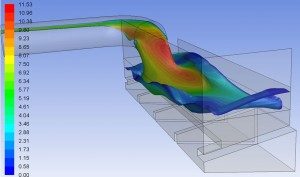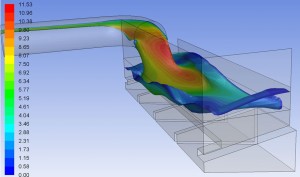 Let’s be honest- in today’s society, individuals are becoming more and more uneasy, not to mention fairly reluctant, when selecting a career path. This is partially due to the price of education rising, combined with the amount of time required to dedicate yourself to an education. That being said, thorough research should be done to ensure that the career choice you have chosen is right for you!
Let’s be honest- in today’s society, individuals are becoming more and more uneasy, not to mention fairly reluctant, when selecting a career path. This is partially due to the price of education rising, combined with the amount of time required to dedicate yourself to an education. That being said, thorough research should be done to ensure that the career choice you have chosen is right for you!
Whether you’re halfway through high school or have experienced a lifetime of training in a particular field of engineering, a CFD career, while a more skilled profession, can be extremely rewarding. The key to succeeding with a CFD career, however, is being thoroughly prepared. The following article from innovative-CFD.com provides you with some great tips to ensure that you a prepared for a CFD career.
Preparing for a CFD career while you are in school
If you are still in school, or if you are in a position where you can attend university courses (at least part time), I would recommend taking some classes:
- Fluid dynamics (so that you understand the physics of what you are modeling).
- Numerical methods (so that you have an understanding of what the CFD codes are doing)
- CFD-specific courses (so that you can see how the numerical methods are applied to the physics of fluids).
Learning CFD when you are already working
If you are already in a full-time job, then you may not have the time to take so many courses. In that case, I recommend attending a short course, such as those offered by your national or regional engineering professional society (in the U.S., that is the AIAA or ASME). Sometimes these courses are offered on-line. Other times they will be held in conjunction with a technical conference (and attending the CFD-related conference sessions is also a good way to learn).
Make use of online resources
In addition, check out some of the free flow solvers available on the web. Gerris and OpenFOAM are two that I’ve looked at. Both of them have tutorials which walk you through the process of setting up a grid, running the code, and doing some analysis of the results. If you work through all the tutorials, it will help to orient you about CFD in general.
For many codes, both free and commercial, there are various online discussion forums you can turn to for help if you get stuck. In my experience, while you may not be able to get answers for every question you have, there are a lot of experienced people out there who will try to help if they can.
You don’t need to know everything to start a CFD career
Keep in mind that you don’t have to learn everything about all types of flows and flow solvers. If you know that you want to use CFD specifically for semiconductor applications, for example, then you can focus on the physics associated with that (and bypass things that aren’t really relevant–like atmospheric reentry physics).
As a CFD engineer myself, I invite you to learn more about CFD and discover the benefits that a CFD career has to offer. Taking classes in school and educating yourself on the various areas of CFD will allow you to become a CFD engineer and help a variety of companies around the world.
If you are interested in a CFD career and have any further questions after reading this article, please let me know. I’d be more than happy to share my personal and professional experiences with you, and explain why I love my job!
